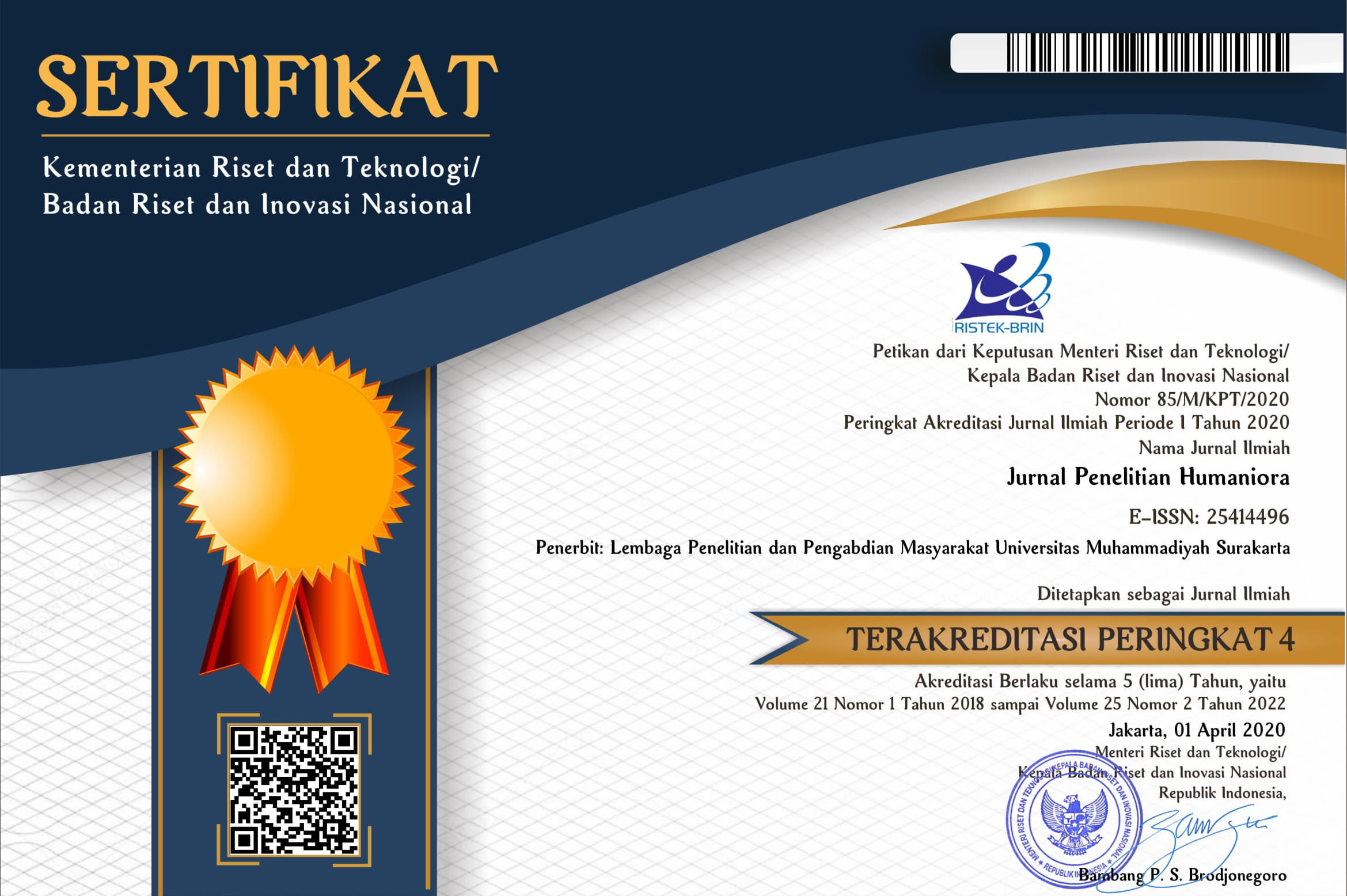STUDENTS’ PERCEPTIONS TOWARD THE IMPLEMENTATION OF GOOGLE APPS FOR EDUCATION DURING PANDEMIC
Rekha - Asmara(1*), Zainal Rafli(2), Ifan Iskandar(3)(1) Universitas Islam Ogan Komering Ilir (UNISKI) Kayuagung
(2) Universitas Negeri Jakarta (UNJ)
(3) Universitas Negeri Jakarta (UNJ)
(*) Corresponding Author
Abstract
This article focused on analyzing the students’ perceptions toward the implementation of Google Apps for Education (GAFE) during pandemic, namely; Google Classroom, Google Meet, and Google Form. A descriptive qualitative research method was applied with twelve undergraduate students majoring English field at Islamic University of Ogan Komering Ilir (UNISKI) Kayuagung taken as the research participants. To collect the data, the participants were asked to respond on the statements within the questionnaire. Likert Scale was then used. Findings showed that students gave positive perceptions regarding to the implementation of Google Apps for Education (GAFE) in online learning during the pandemic era. Most of the statements revealed that most students perceived positively their experience in learning online through the use of GAFE proposed in this study.
Artikel ini berfokus pada analisis persepsi siswa terhadap implementasi Google Apps for Education (GAFE) selama pandemi, yaitu; Google Classroom, Google Meet, dan Google Form. Metode penelitian kualitatif deskriptif diterapkan dengan dua belas mahasiswa sarjana jurusan bahasa Inggris di Universitas Islam Ogan Komering Ilir (UNISKI) Kayuagung diambil sebagai peserta penelitian. Untuk mengumpulkan data, para peserta diminta untuk menanggapi pernyataan dalam kuesioner. Likert Scale kemudian digunakan. Hasil penelitian menunjukkan bahwa siswa memberikan persepsi positif terkait penerapan Google Apps for Education (GAFE) dalam pembelajaran daring di era pandemi. Sebagian besar pernyataan mengungkapkan bahwa sebagian besar siswa merasakan secara positif pengalaman mereka dalam belajar online melalui penggunaan GAFE yang diusulkan dalam penelitian ini.
Keywords
Full Text:
PDFReferences
Asmara, R., Rafli, Z., & Iskandar, I. (2022). Students' perceptions toward the implementation of google apps for education during pandemic. Jurnal Penelitian Humaniora, 24(1).
Awuah, L., J. (2015). Supporting 21st-century teaching and learning: the role of google apps for education (gafe). Journal of Instructional Research, 4; pp. 12-22.
Bashir, A., Uddin, M.E., Basu, B.L., Khan, R. (2021). Transitioning to online
education in English Departments in Bangladesh: Learner perspectives. Indonesian Journal of Applied Linguistics, 11(1), 11-20. https://doi.org/10.17509/ijal.v11i1.34614
Basilaia, G., &Kvavadze, D. (2020). Transition to online education in schools during a SARS-CoV-2 corona virus (covid-19) pandemic in Georgia. Pedagogical Research, 5(4):68-4929.
Chiablaem, P. (2021). Enhancing english communication skills of thai university students through google apps for education (gafe) in a digital era during covid- 19 pandemic. Shanlax: International Journal of Education, 9 (3): 91-98.
Cruickshank, S. (2020). How to Adapt Courses for Online Learning: A Practical Guide for Faculty. HUB Johns Hopkins University.
Dawson, P., Henderson, M., Mahoney, P., Phillips, M., Ryan, T., Boud, D., & Molloy, E. (2019). What makes for effective feedback:Staff and student perspectives. Assessment and Evaluation in Higher Education, 44(1), 25–36.
Fajrian, H. (2020). Antipasi corona, nadiem makarim dukung kebijakan meliburkan sekolah nasional. 1-75.
Francescucci, A., & Rohan, L. (2019). Exclusively synchronous online (viri) learning: the impact on student performance and engagement outcomes. Journal of Marketing Education, 41(1) 60–69.
Heggart, K., & Yoo, J. (2018). Getting the most from google classroom: a pedagogical framework for tertiary educators. Australian Journal of Teacher Education, 43 (3).
Mannong, A. (2020). The students’ eyesight: the effectiveness of learning-based applications on elt in pandemic era. English, Teaching, Learning and Research Journal, 6 (2), pp. 394-407.
Rahman, I., A., & Iwan. (2019). Blending wattpad platform and english prose course in industrial evolution era 4.0. Language in Focus (ELIF), 2(1), 25-32.
Sari, A. B. P. I. R. S., (2020). Google forms as an EFL assessment tool: positive features and limitations. Journal of English Education and Applied Linguistics. 9(2), 231-250.
Septinawati, S., Febriani, R.B., Tarwana, W., & Syafryadin, S. (2020). Students perceptions toward the implementation of quipper school as an e- learning platform in teaching english. Jadila: Journal of Development and Innovation in Language and Literature Education, 1(2), 223-238.
Sianipar, A. Z. (2019). Pengggunaan google form sebagai alat penilaian kepuasan pelayanan mahasiswa. 3(1), 16-22.
Watts, L. (2016). Synchronous and asynchronous communication in distance learning: A review of the literature. Quarterly Review of Distance Education, 17(1), 23-32.
Wart, M. V., Ni, A. Y., Ready, D., Shayo, C., & Court, J. (2020). Factors leading to online learner satisfaction. Business Educational Innovation Journal, 12(1), 15–24.
Article Metrics
Abstract view(s): 245 time(s)PDF: 181 time(s)
Refbacks
- There are currently no refbacks.











